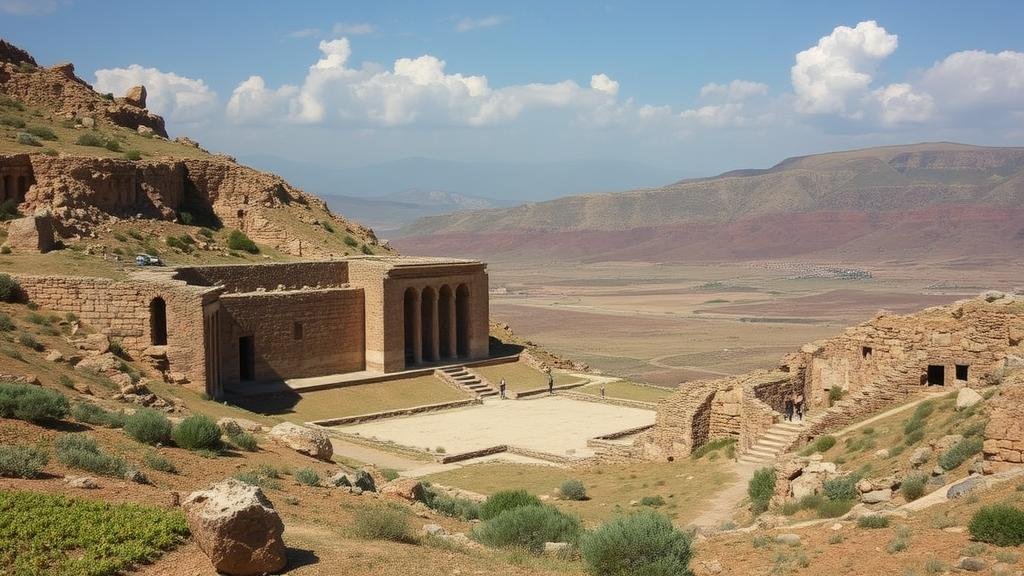Searching for the lost capital of the Hittites’ rival, the enigmatic Kingdom of Arzawa in Anatolia.
The Enigmatic Kingdom of Arzawa: A Quest for Its Lost Capital
In the annals of ancient Anatolian history, few stories captivate the imagination as much as the search for the lost capital of Arzawa, the rival kingdom of the Hittites. Nestled in the geographic region that now comprises western Turkey, Arzawa thrived during the Late Bronze Age, around 1600 to 1200 BCE. This article explores the historical significance of Arzawa, its relationship with the Hittites, and the ongoing archaeological quests to unveil its lost capital.
A Brief Historical Overview of Arzawa
Arzawa emerged as a prominent entity during the 16th century BCE when it became a formidable power in its region. It was a confederation of smaller states, characterized by its unique culture and advanced metallurgy. Arzawa’s influence extended across western Anatolia, and it played a vital geopolitical role, especially as tensions with the Hittite Empire escalated.
The kingdom is frequently mentioned in Hittite texts, indicating both fierce rivalries and political alliances. For example, King Hattusili I of the Hittites and subsequent monarchs recognized Arzawas importance, often referring to it as a potential source of both trade and military conflict.
Geopolitical Context: Arzawa and the Hittites
The relationship between Arzawa and the Hittites was complex, marked by both hostility and strategic marriages. Hittites sought to expand their influence, while Arzawa aimed to maintain its autonomy. One notable episode was the military campaigns led by Hittite King Mursili II in the 15th century BCE to quell Arzawa’s resistance. The outcome solidified Hittite dominance but did not extinguish Arzawa as a cultural entity.
The Mystery of Arzawas Capital
Despite its historical significance, the exact location of Arzawas capital has remained a mystery. Historical documents refer to cities like Apasa and Wilusa, but which of these was the true capital remains debated among scholars. Various archaeological excavations throughout western Anatolia have aimed to elucidate this mystery.
- Apasa: Often identified with the modern site of Ephesus, this location has yielded artifacts suggesting it was a center of power.
- Wilusa: The site is linked to the Iliad’s portrayal of Troy, but its association with Arzawa remains inconclusive.
Archaeological efforts have focused on these sites, utilizing advanced technologies such as ground-penetrating radar to uncover any buried structures indicative of a significant urban center.
Recent Archaeological Discoveries
Recent excavations have revealed critical findings that shed light on the culture and advancements of the Arzawan people. For example, in 2020, archaeologists discovered a treasure trove of artifacts in Western Anatolia, including ceramics, metalwork, and tablets inscribed with hieroglyphic texts. e findings underscore Arzawas advanced state of civilization and trade.
Aside from pottery and metal tools, extensive fortifications and urban planning indicators have also been unearthed, hinting at an organized society capable of defending itself and managing resources effectively.
The Importance of Multidisciplinary Research
To piece together the puzzle of Arzawas lost capital, a multidisciplinary approach has proven invaluable. Historians, archaeologists, and linguists collaborate to analyze texts and artifacts. For example, the study of Hittite cuneiform writings provides insights into Arzawas interactions with neighboring cultures, while modern archaeological methodologies refine the understanding of site layouts.
Challenges in the Search
The quest for Arzawas lost capital faces several obstacles. e include:
- Natural degradation of archaeological sites due to climatic conditions.
- Political and geopolitical factors affecting excavation permissions in Turkey.
- Limited financial resources available for extensive archaeological missions.
Plus, the complexities of historical narratives often lead to conflicting interpretations of archaeological data, requiring scholars to approach the stories of Arzawa with caution and rigor.
Conclusion: Why Arzawa Matters Today
The search for the lost capital of the Kingdom of Arzawa is not just a quest for geographical location; it is an exploration of identity, culture, and historical understanding. As researchers continue to uncover the remnants of this enigmatic kingdom, they contribute to a more nuanced picture of ancient Anatolia and its sociopolitical dynamics.
For those interested in the history of ancient civilizations, the saga of Arzawa serves as a reminder of the complexities of cultural interactions, the rise and fall of empires, and the importance of preserving historical sites for future generations.
As archaeological techniques become increasingly sophisticated, the hope remains alive that one day, the true capital of Arzawa will be uncovered, providing profound insights into a civilization that once thrived in its shadow.


